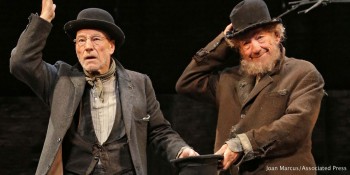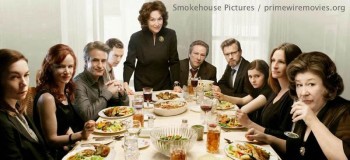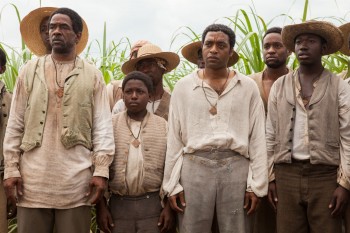When people think of hardcore fan*s, they often picture stereotypes like the guys of The Big Bang Theory hanging out in the comic book store, or of the legions of fan*s and cosplayers at Comic-Con. Rarely is the first thing on someone’s mind when fanning is mentioned going to be Shakespeare or theater.
However, believe it or not, some of the biggest celebrities that fan*s have fallen in love with also perform Shakespeare on stage in live theater. Fan*s can dress up as the Doctor at Comic-Con and also enjoy Shakespeare; the two aren’t mutually exclusive. And sometimes, those interests even overlap.
Recently, Tom Hiddleston, whom most fan*s recognize as Loki from the Marvel Cinematic Universe, starred in a stage production of Shakespeare’s Coriolanus produced by National Theatre Live in London. While most Americans weren’t able to travel to see the live production at the Donmar Warehouse in England, National Theatre Live records its plays and broadcasts them in certain theaters around the globe. It’s an excellent way to see brilliant British theatre productions when you’re stuck stateside, like me.
This production of Coriolanus was fantastic. Even Hiddleston fan*s have to admit he was just one of the many terrific things about this play. The production made superb use of a black box space, using just a simple square stage with no scenery or backdrop aside from the cement wall of the warehouse behind them. Coriolanus is a fairly raw play to begin with, and stripping it down to, for the most part, just the actors on the stage really focused attention on the performances, which were all brilliant.
Aside from Hiddleston, fan*s may also recognize Mark Gatiss, co-creator and star of Sherlock, as well as Alfie Enoch, better known as Dean Thomas from the Harry Potter movies.
Another production that National Theatre Live broadcasts in the States almost every year is a fascinating staging of Frankenstein directed by Danny Boyle, known for Slumdog Millionaire and more. This production stars two Sherlocks, each taking turns with the two lead roles. One night, Benedict Cumberbatch will play Dr. Frankenstein while Jonny Lee Miller plays the Creature, and the next night they switch roles. I’ve seen the version with Cumberbatch playing the Creature and it was incredible. If, for any reason, anyone still doubts Cumberbatch’s acting abilities, they need only watch this production to have that doubt erased.
If you’re a fan* as well as a Broadway lover, there have been many opportunities for your interests to overlap recently. Doctor Who fan favorite Arthur Darvill was starring in Once for several months, which I’m sure was enjoyable if you had a chance to see it. Also, at the beginning of January, Chuck’s Zachary Levi finished up a run with the musical First Date, which was wonderful, according to reviews. Emmy-winner Jim Parsons also made his Broadway debut in the 2011 production of The Normal Heart, which is being adapted as a television movie this year.
I can’t mention Broadway productions without bringing up one of the best friendships in the business: Patrick Stewart and Ian McKellan, who are starring in repertory productions of No Man’s Land and Waiting for Godot that have gotten rave reviews. And if you follow either of these gentlemen on Twitter, you know just how awesome they really are. As an added bonus, these productions also star Billy Crudup, who may be more recognizable to some fans as Watchmen’s Dr. Manhattan.
McKellan and Stewart are also both accomplished Shakespearean actors. Recently, Stewart played a small role in the BBC’s The Hollow Crown, a miniseries adapting the second of the Bard’s historical tetralogies: Richard II; Henry IV, Part 1; Henry IV, Part 2, and Henry V. Stewart played John of Gaunt in Richard II. He has also played Claudius on stage and on film in the Royal Shakespeare Company’s Hamlet, which starred another fan* favorite, David Tennant.
Tennant is probably most famous for his role as the 10th Doctor on the long-running British sci-fi series Doctor Who. He also played Barty Crouch Jr. in Harry Potter and the Goblet of Fire. Recently, he has taken on a variety of roles, including starring in several stage productions of Shakespeare’s works. In just the last few years, he has appeared as Hamlet, Benedek in Much Ado About Nothing (alongside former Doctor Who companion Catherine Tate), and Richard II in the Royal Shakespeare Company production.
Speaking of Shakespeare, I’d be remiss if I didn’t include possibly the ultimate crossover between fandom and Shakespeare: Joss Whedon’s Much Ado About Nothing. The movie was filmed during a break in filming The Avengers and stars many of the actors fan*s have come to know and love from Whedon’s other beloved series. The entire film was shot at Whedon’s own home in black and white and is one of my favorite film adaptations of Shakespeare ever.
The best parts of the film are all the subtle (and sometimes not-so-subtle) actions and expressions of the characters in the background. The film flows with a relaxed pace and it’s easy to feel the chemistry and friendship between the actors. This was a project most of them did for fun because they enjoyed working together, and I think some of that comes through in the finished product. If you’re a fan* as well as a Shakespeare lover, I cannot recommend this film highly enough.
And finally, we’ve come full circle. Aside from Hiddleston’s recent stage performance of Coriolanus, he also starred as Prince Hal, the man who becomes Henry V, in the The Hollow Crown. The series aired in the United Kingdom shortly before the Summer Olympics in 2012, and in the United States back in September. It can now be purchased on DVD, and each play is a fairly faithful adaptation of Shakespeare’s work. They are beautifully filmed and the cast is magnificent: aside from Hiddleston and Stewart, you also have Jeremy Irons, Ben Whishaw, Michelle Dockery, Joe Armstrong, Simon Russell Beale, and many others, all of whom are amazing.
This is just an overview of a few of the theatre works some of our favorite celebrities have done in the last few years. If you know of something I missed, feel free to share it in the comments so we can all experience it! One of my favorite parts of being a fan* is introducing people to new things; you wouldn’t believe how many Supernatural and Doctor Who converts I’ve made over the years.
Like I said last week, we now live in a time where it’s cooler to be a fan* than it used to be, so let’s take advantage of that and show everyone just how cool we can be. We can fan out over the new Guardians of the Galaxy trailer or Benedict Cumberbatch on Sesame Street and still enjoy things like Shakespeare and wine.
To be or not to be isn’t the question any more, because now we can have both.


